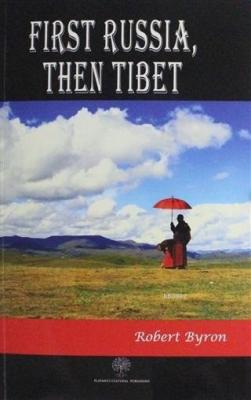9786257941563
496679

https://www.turkishbooks.com/books/first-russia-then-tibet-p496679.html
First Russia Then Tibet
8.736
"In the last century, the rise of an intellectual class gave mouth and power to this Russo-Messianic concept of collective uplift. At the same time there arrived from the West the new industrial idea of a purely physical universe ruled by a God who was nothing more than a chemist-engineer. Such an idea, reacting on the pervasive mysticism of Orthodoxy and the fantastic sects that had sprouted from so fertile a soil, produced a philosophic vacuum, a kind of mystic nothingness, which was elaborated into a system by Bakunin (1814-76) under the name of Nihilism.
Then began the classic era of sacrificial plotters, whose dramatic assassinations attracted the attention of the outside world. It was complacently imagined by their liberal sympathizers in other countries that the murderers, if slightly misguided in their methods, were inspired by the desire to free their country from a brutal autocracy. Even to-day this idea is ingeniously fostered in the minds of foreign tourists by the transformation of the fortress of Peter and Paul, where the chief rebels were confined, into a museum for the display of Tsarist atrocity."
Then began the classic era of sacrificial plotters, whose dramatic assassinations attracted the attention of the outside world. It was complacently imagined by their liberal sympathizers in other countries that the murderers, if slightly misguided in their methods, were inspired by the desire to free their country from a brutal autocracy. Even to-day this idea is ingeniously fostered in the minds of foreign tourists by the transformation of the fortress of Peter and Paul, where the chief rebels were confined, into a museum for the display of Tsarist atrocity."
"In the last century, the rise of an intellectual class gave mouth and power to this Russo-Messianic concept of collective uplift. At the same time there arrived from the West the new industrial idea of a purely physical universe ruled by a God who was nothing more than a chemist-engineer. Such an idea, reacting on the pervasive mysticism of Orthodoxy and the fantastic sects that had sprouted from so fertile a soil, produced a philosophic vacuum, a kind of mystic nothingness, which was elaborated into a system by Bakunin (1814-76) under the name of Nihilism.
Then began the classic era of sacrificial plotters, whose dramatic assassinations attracted the attention of the outside world. It was complacently imagined by their liberal sympathizers in other countries that the murderers, if slightly misguided in their methods, were inspired by the desire to free their country from a brutal autocracy. Even to-day this idea is ingeniously fostered in the minds of foreign tourists by the transformation of the fortress of Peter and Paul, where the chief rebels were confined, into a museum for the display of Tsarist atrocity."
Then began the classic era of sacrificial plotters, whose dramatic assassinations attracted the attention of the outside world. It was complacently imagined by their liberal sympathizers in other countries that the murderers, if slightly misguided in their methods, were inspired by the desire to free their country from a brutal autocracy. Even to-day this idea is ingeniously fostered in the minds of foreign tourists by the transformation of the fortress of Peter and Paul, where the chief rebels were confined, into a museum for the display of Tsarist atrocity."
Yorumlar (0)
Yorum yaz
Bu kitabı henüz kimse eleştirmemiş.















